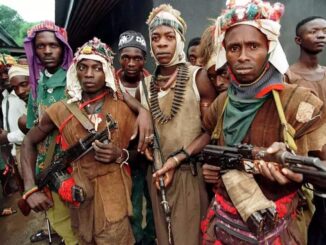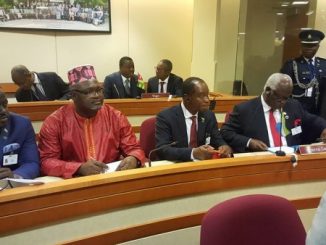By Tamba Borbor
Thursday June 23, 2005
President Dr. Alhaji Ahmad Tejan Kabbah has said that “without a comprehensive Disarmament, Demobilisation and Reintegration programme, the prospects for long-term stability will remain dim.” The President was speaking today 21st June at the opening of a three-day United Nations Conference on Disarmament, Demobilisation, Reintegration (DDR) and Stability in Africa held at the Miatta Conference Hall Brookfields.
President Kabbah stated that Sierra Leone feels exceptionally proud and challenged for being chosen to host this very important event during its post-conflict transition. He noted that the timing and theme of the conference are very significant for the African continent as Africa has experienced and is still enduring too many gruesome conflicts and senseless acts of violence. “These conflicts have eroded the human resource base and overall potential for development in the continent,” the President said. He went on to state that inspite of the instability that has swathed the continent, “Africa has devoted much time, efforts and resources to resolve or manage its own conflicts. the reason for this is simple. It has dawned on African leaders that peace, security and development are inextricably linked.”
President Dr. Ahmad Tejan Kabbah maintained that this conference also sends the rights signals and shows the continued commitment of the United Nations and the rest of the international community to breaking the cycle of violence and promoting durable peace and stability in Africa. He recalled that Sierra Leone drifted towards chaos following an invasion by a group of rebels from Liberia in 1991; adding, “after a protracted peace process and the steadfast support of the international community, we have gone through a transition from war to peace and DDR has been at the heart of this process. ”
About Sierra Leone’s DDR programme, President Kabbah noted that it has been assessed as successful by all stakeholders and that it has provided the basis for the progress recorded in the country’s post-conflict stabilisation and development programme. He hoped that delegates would be able to share their countries’ experiences by looking at different ways of tackling the issues of DDR and stability in Africa.
In his welcome address, the former Special Representative of the Secretary General (SRSG) in the Democratic Republic of Congo, Cameroonian-born Dr. Namanga Ngongi on behalf of the Under-Secretary-General Ibrahim Gambari said that the Secretary General of the United Nations accords the highest priority to issues related to peace and stability in Africa of which DDR is a major component. He quoted a recent report of the Secretary-General’s High-level Panel on Threats, Challenges and Change, which notes that “demobilising combatants is the single-most important factor determining the success of peace operations. Without demobilisation, civil wars cannot be brought to an end and other critical goals- such as democratisation, justice and development- have little chance for success.”
Dr. Ngongi noted that DDR programmes had placed emphasis primarily on the disarmament and demobilisation of ex-combatants. ” However, lasting and durable peace requires more than the disarming and demobilisation of ex-combatants. The greater challenge is how to integrate them into well-functioning and well-governed societies that offer attractive long-term opportunities and benefits for all citizens, particularly the youth,’ he stated. Participants attending the three-day conference, which was funded by the Governments of Sweden, Finland and Germany, are from African countries with experience and interest in DDR namely: Angola, Burundi, Cote d’Ivoire, the Democratic Republic of Congo (DRC), Eritrea, Ethiopia, Liberia, Mozambique, Nigeria, Rwanda, south Africa, Sudan Uganda, Zimbabwe among others. The. conference ends on Thursday by which time it is expected that a model for DDR would have been formulated for use by the UN and other international bodies.




Leave a Reply